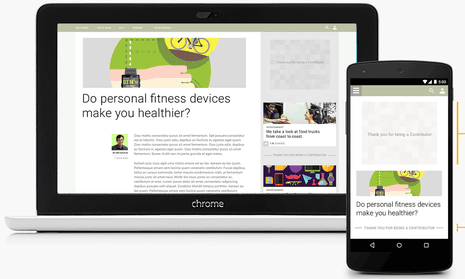Google is launching a new service that allows browsers to pay a monthly fee to avoid the adverts on sites that use Google’s advertising services.
The Google Contributor service is an experiment to see whether websites can be funded by small payments from readers rather than having to rely on advertising to make money.
How does it work?
People who don’t want to see ads on their favourite sites but are willing to pay a small monthly fee to help support the sites can sign up with Google’s Contributor service.
When a reader visits a participating site that uses Google’s advertising services to make money from viewers of the site, Contributor pays the site a small sum from the small monthly fee instead of money for advertising views. It means that users only support sites that they visit regularly.
What about the ads?
The ads are replaced with a small message thanking them for being a contributor. The space where the advert would have been is filled with a pixelated pattern, instead of being removed entirely, apart from on mobile devices where the publisher can choose to have them removed.
How much does it cost?
Google lets users choose how much they want to pay to not see ads from $1, $2 or $3 (£1.91) a month tied to a Google account. Google has not given details on how much money it will make, or how much publishers’ sites, will make compared to revenues from display ads, though its promotional material for Contributor states: “When visiting a participating website, part of your contribution goes to the creators of that site.”
Which sites can I use it on?
Google is starting the service with 10 publishing partners, including Mashable, Imgur, WikiHow and Science Daily. Sites outside of the trial will still show adverts as normal, even if they use Google’s advertising platform.
The service will expand to include more sites as more publishers sign up, but is only working with sites and publishers based in the US for the time being.
How can I sign up?
Initially access to Contributor is via invitation only, similar to the launch of many of Google’s other services including Gmail and the new Inbox app. Users can sign up for a waiting list to be invited.
Once invited users can see which sites are participating in the scheme and choose whether to join or not.
Everything is handled through a Google account, which means the user has to be logged into that Google account while browsing to trigger the Contributor system rather than adverts on participating sites.
Are there alternatives?
Some publishers, including the Next Web, have already experimented with reader-supported subscriptions that remove ads from their site. A yearly subscription to the Next Web, which removes ads and gives access to a full RSS feed, costs $36.30.
A service called Readability tried something similar to Google’s Contributor, allowing users to pay a small monthly sum that was then distributed to participating sites when a user visited them. The service shut down in 2012.
Some sites, including the Guardian, allow users to pay to remove adverts in their smartphone and tablet apps, but not for their freely available web versions.
Is this the future of the web?
Many different funding mechanisms have been tried over the years to pay for web content. Paywalls such as those used by the Wall Street Journal, Financial Times and the Times are the latest experiment at making money from readers without relying solely on advertising. Those sites still show advertising, however.
Google’s experiment could prove whether readers of sites are actually willing to pay for the content they enjoy on a cross-site basis, and Google has the advantage of being able to remove the adverts when people do.




Comments (…)
Sign in or create your Guardian account to join the discussion